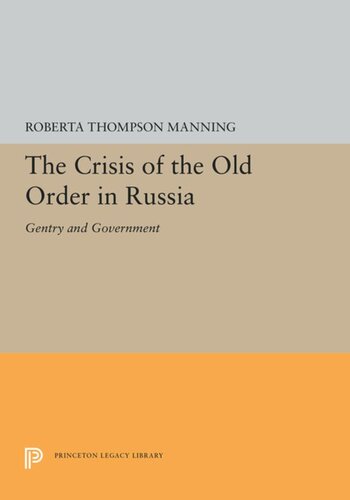

Most ebook files are in PDF format, so you can easily read them using various software such as Foxit Reader or directly on the Google Chrome browser.
Some ebook files are released by publishers in other formats such as .awz, .mobi, .epub, .fb2, etc. You may need to install specific software to read these formats on mobile/PC, such as Calibre.
Please read the tutorial at this link: https://ebookbell.com/faq
We offer FREE conversion to the popular formats you request; however, this may take some time. Therefore, right after payment, please email us, and we will try to provide the service as quickly as possible.
For some exceptional file formats or broken links (if any), please refrain from opening any disputes. Instead, email us first, and we will try to assist within a maximum of 6 hours.
EbookBell Team

0.0
0 reviewsFocusing on the role of the landowning gentry in the First Russian Revolution of 1905-1907, Roberta Manning explores the complex relationship between this traditional social and political elite and the imperial Russian government in the period between the abolition of serfdom and the February Revolution of 1917. In contrast to the commonly accepted view that the 1905 Revolution significantly expanded the circle of people involved in government, Professor Manning argues that the gentry became Russia's dominant political force after the 1907 coup d'etat. Overwhelmed after Emancipation by economic crisis and a devastating erosion of their role in government service, the gentry utilized the revitalized assemblies of the nobility and the newly founded zemstvos first to agitate for and then to dominate the representative institutions created by the 1905 Revolution.
Through a vast array of primary sources, Professor Manning considers the acquisitions and consequences of the gentry's augmented political role and presents an updated account of the peasant rebellions of 1905-1907 and their impact on the gentry. Included is a brilliant portrayal of P.A. Stolypin, the period's most gifted gentry statesman, and of the defeat, accomplished with the aid of gentry pressure groups, of his reform program, the last comprehensive effort to restructure the political order of Imperial Russia.
Studies of this period of Russian history have generally focused on the dramatic confrontation between the Old Regime and its revolutionary adversaries. Here Professor Manning illuminates the equally fateful conflicts within the Russian upper classes.
Roberta Thompson Manning is Associate Professor at Boston College.
Studies of the Russian Institute, Columbia University.
Originally published in 1983.
The Princeton Legacy Library uses the latest print-on-demand technology to again make available previously out-of-print books from the distinguished backlist of Princeton University Press. These editions preserve the original texts of these important books while presenting them in durable paperback and hardcover editions. The goal of the Princeton Legacy Library is to vastly increase access to the rich scholarly heritage found in the thousands of books published by Princeton University Press since its founding in 1905.